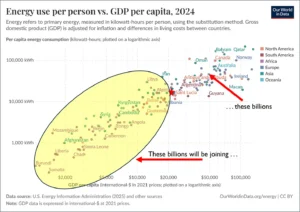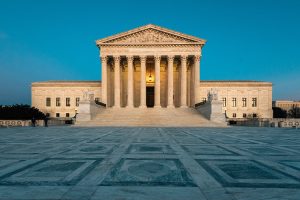
Today, I take a look at what such emerging views on global population might mean for global energy supply and demand and offer three (perhaps provocative) perspectives.
By Roger Pielke Jr. | February 23, 2026

Drones have previously been confined due to limitations such as short battery lives and restricted load capacities. This is beginning to change. With SiFly recently breaking the world record with…
By Shane Tews | February 23, 2026

The Department of Labor framework is unashamedly instrumental: It aims to help workers safely use AI to stay productive rather than equip them as critical agents in shaping AI governance…
By Bronwyn Howell | February 20, 2026

The backlash against data centers is real, bipartisan, and accelerating. But the moratoria are blunt instruments aimed at a poorly defined target. They capture far more than hyperscale AI facilities,…
By Will Rinehart | February 19, 2026

I’ve written about this before, but it bears repeating: Should responsibility for kids’ online safety lie with operating systems and app stores, or with the applications themselves? At first glance,…
By Shane Tews | February 18, 2026

The omission of water vapor in the basket of regulated greenhouse gases is the weakest part of the 2009 Endangerment Finding, as it is totally inconsistent with EPA’s arguments about…
By Roger Pielke Jr. | February 17, 2026

Prospective settlements in several lawsuits blaming conversational chatbots for causing minors to kill themselves aren’t likely to stop related claims from proceeding, with multiple forces driving litigation and settlements failing…
By Clay Calvert | February 17, 2026

Well-intentioned but costly climate mitigation policies risk deepening the challenges faced by the world’s poor.
By Roger Pielke Jr. | February 14, 2026

For now, states appear to be moving cautiously, targeting obvious problems, and signaling attentiveness to constituents without overcommitting to rules they may soon regret. Whether that balance holds as AI…
By Mark Jamison | Fátima Palacios Figueroa | February 13, 2026

As AI agents become more capable, policy should aim less at picking winners in terms of protocol and more at preserving the conditions for open experimentation.
By Will Rinehart | February 12, 2026

You may have heard that the Supreme Court has agreed to take up an interesting Fourth Amendment case. Chatrie v. United States will examine whether the execution of a geofence…
By Jim Harper | February 11, 2026

Well-intentioned but costly climate mitigation policies risk deepening the challenges faced by the world’s poor.
By Roger Pielke Jr. | February 10, 2026

A federal judge’s December ruling in NetChoice v. Griffin bars Arkansas from enforcing part of a new law that restricts the First Amendment rights of both social media users and…
By Clay Calvert | February 10, 2026

Thirty years later, there is still much to learn from our experiences with the Telecommunications Act of 1996. That is the focus of our AEI event of February 10, 2026,…
By Mark Jamison | February 9, 2026

Australian regulations may be stricter with social media, but they lag, not lead, most American initiatives.
By Bronwyn Howell | February 6, 2026